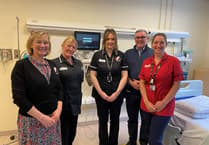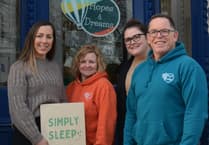Children’s mental health is a priority for the government both during and after the pandemic, writes Helen McKenna.
Head of mental health for the Department of Health and Social Care Ross Bailey appeared during Friday’s government press briefing, offering the public advice on how to take care of their mental health during the lockdown.
Chief Minister Howard Quayle introduced Mr Bailey to the panel by saying: ’We asked Ross along today because we know that people are struggling. And we want everyone to know that there is help and resources out there to support you.’
Mr Ross said: ’Taking genuine and proactive care over emotional wellbeing has historically so often played second-fiddle to other priorities in life, whether that be raising a family, financial pressures, physical health or living through a pandemic. The undeniable fact is, however, that our emotions, the way we think and feel, determines and drives our behaviour and consequently has a fundamental impact on all of these so-called priorities.
’Given the current climate, one could argue that caring about our emotional wellbeing has never been more important. And I’d like to use this opportunity to speak briefly about the choices we have collectively and individually to both acknowledge and take care of that most precious of assets, our emotional health.’
Mr Bailey went on to say that people should look out for signs of low mood and anxiety: irritability, restlessness, struggling to sleep, a feeling of emptiness and a loss of interest in activities you used to enjoy.
He also said the following would help alleviate these symptoms: exercise, learning new things, acts of kindness, not being overly self-critical and paying attention to the people around you and yourself.
When the Examiner asked Mr Bailey and the Education Minister Dr Alex Allinson MHK about what was being done by both DHSC and the Department of Education, Sport and Culture to help children’s mental health both during and after the lockdown, Mr Bailey replied: ’It’s enormously difficult. What we’re trying to do and what we need to be doing and what’s started, is to work collaboratively with our colleagues in the DESC, women and children’s services and in the third sector to build on our package of provision. And that’s a project that’s under way - clearly that’s in the future.
’We absolutely need to work collectively to address this problem long-term. We’ve learnt a huge amount over the last 12 months in terms of care for children and how important it is for them to socialise and be around their friends. From my perspective, it’s about the long-haul and working corroboratively in the future.’
Dr Allinson added: ’Teachers and also some of the support workers can contact [families] when they’re at home. Also, on the DESC website, there’s a whole range of signposts for wellbeing and mental health issues for those at home to offer support and point them in the right direction.
’One of the things we’ve had working throughout normal activities at our secondary schools was a very good listening service, using both user services and [mental health charity] Isle Listen and a couple of other charities. What we’ll be looking at doing after the Easter holidays is ramping that up, making that much more accessible and making sure that young people who have been struggling during this very dark time for our island have the ability to talk to somebody and to be listened to. As Ross said, that ability to be listened to and for your problems and your experiences to be shared, that can be very therapeutic.’
A letter was circulated to parents of pupils aged 15 to 18 at Ramsey Grammar School last week from acting headteacher Graeme Corrin.
He wrote: ’Clearly, wellbeing at this moment in time is in all of our minds and at Ramsey Grammar School we have always prided ourselves and received recognition for the amount of wellbeing support that we provide.
’Even during the lockdown we are working closely with agencies such as Reach IoM, Listening Service, Isle Listen and Cruse. We really value these partnerships and would encourage you or your children to contact us should you feel you need additional support.
’Of course as a school we have a vast internal network of support through form tutors and heads of year and their deputies. Any support required from our own staff may be accessed either from the morning registration form or via pastoral Google classrooms.
’Directly linked to mental health and emotional wellbeing, we are really pleased to be involved in an initiative with Dr Alex George who is leading an online mental health question and answer session on Monday, March 29, for years 11, 12 and 13.
’This is an exciting and unique opportunity which I hope many of our students will engage with,’ he added.
For more information about mental health advice for children and young people, visit covid19.gov.im/areyouok.




